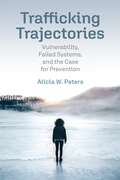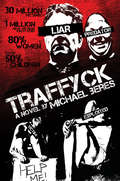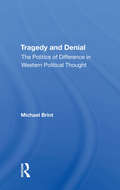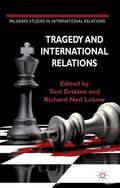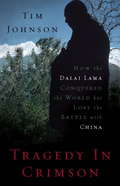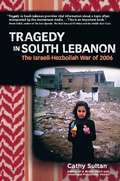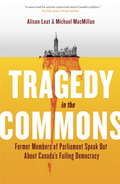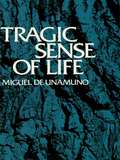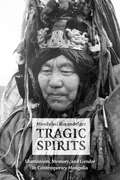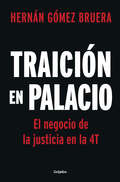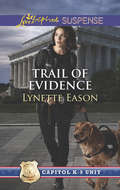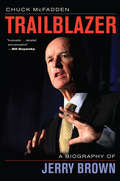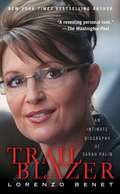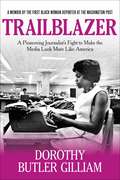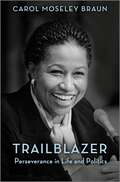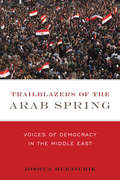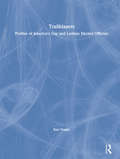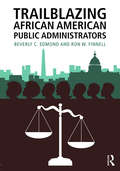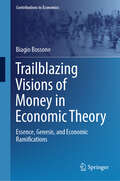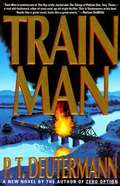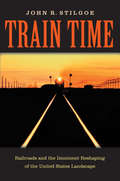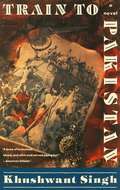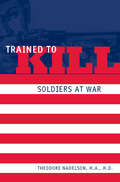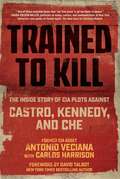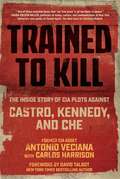- Table View
- List View
Trafficking Trajectories: Vulnerability, Failed Systems, and the Case for Prevention (Pennsylvania Studies in Human Rights)
by Alicia W. PetersHighlights the role structural vulnerability plays in the lived realities of domestic sex trafficking survivors before, during, and after traffickingDrawing on survivor narratives and ethnographically rich accounts from frontline workers in New England, specifically Maine and New Hampshire, Trafficking Trajectories contextualizes the ways in which structural vulnerability is embodied by domestic sex trafficking survivors in complex ways over time. The book also makes legible where and when upstream responses are most needed to prevent trafficking from occurring.Trafficking Trajectories counters the dominant trafficking narrative of victims and villains and how this narrative decontextualizes and isolates the period of victimization and rescue from broader experiences of vulnerability. Instead, Alicia Peters centers survivor experience to highlight the role of structural violence and vulnerability before, during, and after trafficking. Focusing on the lived realities of survivors, she argues that prioritizing an interventionist criminal legal response to trafficking does little to address the issues that make individuals vulnerable to trafficking in the first place and fails to end trafficking.Peters combines nuanced accounts of survivors with the observations and quandaries faced by frontline workers to reveal opportunities for rethinking and broadening the response to trafficking to make it more focused on prevention, and thus more effective. The book reframes trafficking—not as sporadic instances of interpersonal violence requiring criminal legal intervention— but as structural violence that requires systematic and preventive intervention. Trafficking Trajectories concludes with a series of policy recommendations intended to address human trafficking at its root.
Traffyck
by Michael BeresWhen a Kiev video store is torched, the wife of the now-deceased owner-and primary suspect in the arson case-hires private investigator Janos Nagy. As he delves into the woman's past, Janos discovers things are far more than meets the eye, and as the case is pursued further, a human trafficking plot unfolds from Kiev across the Ukraine. With mixed involvement of Eastern European and Russian mafia, the Ukraine Secret Service, and both orthodox and nonorthodox church rivalries, the race to untangle the threads of the international trafficking ring turns quickly to a matter of life and death.
Tragedy And Denial: The Politics Of Difference In Western Political Thought (Springboard Lvls 09-16 A Ser.)
by Michael E BrintTo do political theory is to tell a story about human beings and their communities. In this witty and elegant book, Michael Brint provides a brilliant reading of some of the greatest stories told in the history of Western political theory. The unifying theme is the issue of differences and the conflicts they generate. Brint's targets are those thin
Tragedy and International Relations
by Richard Ned Lebow Toni ErskineNowhere are clashes between competing ethical perspectives more prevalent than in the realm of International Relations. Thus, understanding tragedy is directly relevant to understanding IR. This volume explores the various ways that tragedy can be used as a lens through which international relations might be brought into clearer focus.
Tragedy in Crimson: How the Dalai Lama Conquered the World but Lost the Battle with China
by Tim JohnsonTragedy in Crimson is award-winning journalist Tim Johnson’s extraordinary account of the cat-and-mouse game embroiling China and the Tibetan exile community over Tibet. Johnson reports from the front lines, trekking to nomad resettlements to speak with the people who guard Tibet’s slowly vanishing culture; and he travels alongside the Dalai Lama in the campaigns for Tibetan sovereignty. Johnson unpacks how China is using its economic power around the globe to assail the Free Tibet movement. By encouraging massive Chinese migration and restricting Tibetan civil rights, the Chinese are also working to dilute Tibetan culture within Tibet itself. He also takes a sympathetic but unsentimental look at the Dalai Llama, a popular figure in the West who is regarded as a failure by many of his own people. Staggering in scope, vivid and audacious in its narrative aims, Tragedy in Crimson tells the story of a people on the brink of cultural extinction and the rising nation that is quashing them.
Tragedy in South Lebanon
by Cathy SultanThrough history, research and personal interviews, Cathy Sultan chronicles life in southern Lebanon and northern Israel during the brutal war of the summer of 2006. As in her other critically acclaimed books, Sultan focuses on ordinary people, who are overlooked by politicians and military leaders and become victims of poor decisions made by the governments of Israel, Lebanon and the United States.She vividly portrays the polluting effects of cluster bombs and explains how different factions within the Lebanese government keep it on the brink of further violence. She writes of the tiny Shabba Farms area's importance to Hezbollah and of the refugee camp that holds members of Fatah al-Islam, a Sunni militant group, despite efforts of the Lebanese army. Sultan also addresses media treatment of the war, dispels common myths about the region, and includes a timeline of Lebanese history, and maps depicting violence around the area.
Tragedy in the Commons
by Michael Macmillan Alison LoatIn Tragedy in the Commons, Alison Loat and Michael MacMillan, founders of the non-partisan think tank Samara, draw on an astonishing eighty exit interviews with former Members of Parliament from across the political spectrum to unearth surprising observations about the practice of politics in Canada. Though Canada is at the top of international rankings of democracies, Canadians themselves increasingly don't see politics as a way to solve society's problems. Small wonder. In the news, they see grandstanding in the House of Commons and MPs pursuing agendas that don't always make sense to the people who elected them. But elected officials make critical choices about how this wildly diverse country functions today and how it will thrive in the future. They direct billions of dollars in public funding and craft the laws that have allowed Canada to lead the way internationally. Even with so much at stake, citizens--voters--are turning away. How did one of the world's most functional democracies go so very wrong? In Tragedy in the Commons, MPs describe arriving at their political careers almost by accident; few say they aspired to be in politics before it "happened" to them. In addition, almost without fail, each MP describes the tremendous influence of their political party: from the manipulation of the nomination process to enforced voting in the House and in committees, the unseen hand of the party dominates every aspect of the MP's existence. Loat and MacMillan ask: Just what do we want Members of Parliament to be doing? To whom are they accountable? And should parties be trusted with the enormous power they wield with such little oversight or citizen involvement? With unprecedented access to the perspective and experience of Canada's public leaders, Tragedy in the Commons concludes by offering solutions for improving the way politics works in Canada, and how all Canadians can reinvigorate a democracy that has lost its way, its purpose and the support of the public it is meant to serve.
Tragic Sense of Life
by Miguel De UnamunoThe acknowledged masterpiece of one of Spain's most influential thinkers. Between despair and the desire for something better, Unamuno finds that "saving incertitude" that alone can console us. Dynamic appraisal of man's faith in God and in himself.
Tragic Spirits: Shamanism, Memory, and Gender in Contemporary Mongolia
by Manduhai BuyandelgerA “highly readable ethnographic study” of the resurgence of shamanism among nomadic Mongolians in a time of radical political and economic change (The Journal of Asian Studies).Winner, Francis Hsu Book Prize from the Society for East Asian AnthropologyShortlisted, ICAS (International Convention of Asia Scholars) Book PrizeThe collapse of socialism at the end of the twentieth century brought devastating changes to Mongolia. Economic shock therapy—an immediate liberalization of trade and privatization of publicly owned assets—quickly led to impoverishment, especially in rural parts of the country, where Tragic Spirits takes place. Following the travels of the nomadic Buryats, Manduhai Buyandelger tells a story not only of economic devastation but also a remarkable Buryat response to it—the revival of shamanic practices after decades of socialist suppression. Attributing their current misfortunes to returning ancestral spirits who are vengeful over being abandoned under socialism, the Buryats are now at once trying to appease their ancestors and recover the history of their people through shamanic practice. Thoroughly documenting this process, Buyandelger situates it as part of a global phenomenon, comparing the rise of shamanism in liberalized Mongolia to its similar rise in Africa and Indonesia. In doing so, she offers a sophisticated analysis of the way economics, politics, gender, and other factors influence the spirit world and the crucial workings of cultural memory.“An excellent addition to studies in the area . . . emotive, accessible and well-researched.” —London School of Economics Review of Books
Traición en Palacio: El negocio de la justicia en la 4T
by Hernán Gómez Bruera=Adquiere el libro en preventa hasta el 25 de junio del 2023. Este título estará disponible de forma normal a partir del 26 de junio del 2023.= Antes de finalizar el tercer año de su gobierno, Andrés Manuel López Obrador apartó de su equipo disfrazando el hecho como una salida amistosa a Julio Scherer Ibarra, uno de sus hombres de mayor confianza, e hijo de uno de los periodistas más reconocidos en la historia reciente de México. Nunca se explicaron los verdaderos motivos, y este hecho tampoco tuvo la resonancia que merecía, pese a que quien se iba era, quizá, el segundo hombre más poderoso del país en ese momento. A partir de una acuciosa investigación, Hernán GómezBruera-analista político, periodista y entrevistador- detalla que detrás de esa salida se escondía un historial de traición, tanto a la memoria de su padre como a la narrativa central del movimiento político que lo llevó al poder: erradicar la corrupción y separar el poder económico del poder político. Traición en Palacio es, por un lado, la historia del todopoderoso exconsejero jurídico que aprovechó su posición privilegiada en el gobierno para controlar buena parte del sistema de justicia en México. Y por el otro, una denuncia de los mecanismos de corrupción en elPoder Judicial con los que se fabrican culpables y se vende impunidad; una detallada descripción de un modus operandi que la 4T no ha logrado erradicar.
Trail of Evidence
by Lynette EasonSAVING HIS SON Why is a dead woman's phone-evidence in a murder investigation-in Jonas Parker's son's bedroom? Dangerous thugs are after that phone and his terrified teenager, so the single father turns to Capitol K-9 Unit officer Brooke Clark. Years ago, Brooke broke Jonas's heart without explanation. But he has to trust her and her highly-trained golden retriever to keep his son safe. When the boy goes missing, Jonas and Brooke must make peace with their past to find the teen-before increasingly desperate criminals get to him first. Capitol K-9 Unit: These lawmen solve the toughest cases with the help of their brave canine partners.
Trailblazer
by Chuck McfaddenIn this first biography of Edmund Gerald Brown Jr. in more than thirty years, Chuck McFadden explores the unique persona of one of the most idiosyncratic politicians in California history. Son of California political royalty who forged his own political style against the tumultuous backdrop of a huge, balkanized state--and shoved to and fro by complex currents--Jerry Brown plumbed his visionary impulses as well as his grandiose ambitions. McFadden traces Brown's childhood in San Francisco, his time studying for the priesthood, his unusual political career, and his romances--including a long-term relationship with singer Linda Ronstadt. He describes Brown's first two terms as governor advocating for farm workers, women and minorities, his time roaming the world in a spiritual quest, and his return to the gritty world of politics as chairman of the California Democratic Party and then mayor of Oakland. Political experts weigh in with thoughts about the remarkable 2010 campaign that saw the 72-year-old Brown winning his third term in office while being vastly outspent by Republican Meg Whitman. Concise, insightful, and enlivened by the events and personalities that colored the history of California, Trailblazer provides an intimate portrait of the pugnacious, adept politician who has bucked national trends to become a leader of one of the largest economies in the world.
Trailblazer
by Lorenzo BenetA fascinating biography of Sarah Palin with exclusive new information, written by People magazine assistant editor Lorenzo Benet--who was the last person to interview her prior to her nomination as John McCain's vice presidential candidate. Sarah Palin has been the focus of countless news stories on everything from her signature "up-do" to her governorship of Alaska--even her teenage daughter's pregnancy. Expanding upon the People magazine cover story conducted just before McCain announced his choice for running-mate, Lorenzo Benet offers a never-before-seen look at the life of Sarah Palin--giving readers unprecedented insight into both her personal and professional background. Trailblazer delves into Palin's relationship with her husband Todd, including details on how they met and their shocking elopement, as well the births of their children, Track, Willow, Piper, Bristol, and the surprise of little Trig. Palin's career has been a swift if winding journey, leading her and her family in vastly different directions. From her commercial fishing venture to her stint as a local sportscaster for an Anchorage television station, Sarah has worn many hats, eventually leading her to a career in politics. With her beauty, charisma, and political ruthlessness, she quickly skyrocketed from town council member to mayor to governor to vice-presidential nominee. A captivating human interest story, Trailblazer is an intimate portrait of a small-town, self-proclaimed hockey mom who has captured the nation's attention and rejuvenated the Republican party. a Sarah Palin that the world is only just coming to know.
Trailblazer: A Pioneering Journalist's Fight to Make the Media Look More Like America
by Dorothy Butler GilliamDorothy Butler Gilliam, whose 50-year-career as a journalist put her in the forefront of the fight for social justice, offers a comprehensive view of racial relations and the media in the U.S.Most civil rights victories are achieved behind the scenes, and this riveting, beautifully written memoir by a "black first" looks back with searing insight on the decades of struggle, friendship, courage, humor and savvy that secured what seems commonplace today-people of color working in mainstream media.Told with a pioneering newspaper writer's charm and skill, Gilliam's full, fascinating life weaves her personal and professional experiences and media history into an engrossing tapestry. When we read about the death of her father and other formative events of her life, we glimpse the crippling impact of the segregated South before the civil rights movement when slavery's legacy still felt astonishingly close. We root for her as a wife, mother, and ambitious professional as she seizes once-in-a-lifetime opportunities never meant for a "dark-skinned woman" and builds a distinguished career. We gain a comprehensive view of how the media, especially newspapers, affected the movement for equal rights in this country. And in this humble, moving memoir, we see how an innovative and respected journalist and working mother helped provide opportunities for others.With the distinct voice of one who has worked for and witnessed immense progress and overcome heart-wrenching setbacks, this book covers a wide swath of media history -- from the era of game-changing Negro newspapers like the Chicago Defender to the civil rights movement, feminism, and our current imperfect diversity. This timely memoir, which reflects the tradition of boot-strapping African American storytelling from the South, is a smart, contemporary consideration of the media.
Trailblazer: Perseverance in Life and Politics
by Carol Moseley BraunA memoir from Ambassador Carol Moseley Braun detailing her remarkable childhood and political career on the Hill, including her tenure as the first Black female US senatorThe first Black woman ever elected to the Senate. The first woman to represent the state of Illinois. The first Black woman to serve as a US ambassador to New Zealand. These are just a few of the &“firsts&” that Ambassador Carol Moseley Braun can lay claim to since entering politics in the 1970s. Since then, the self-professed &“Black girl from the south side of Chicago&” has been shattering ceilings and making history.Yet her journey to Congress and to international renown was not an easy one, rife with obstacles, controversies, and lessons learned. In Trailblazer, Moseley Braun shares the full story of her extraordinary life in a fascinating narrative filled with poignant, powerful, and sometimes funny stories. Born into a family with a history of civil rights activism and military service dating back to the Civil War, Moseley Braun talks about her childhood in racially segregated Chicago to the present, including marching with Dr. Martin Luther King Jr., running for president as the lone woman in a field of men, and fostering surprising friendships throughout her storied career, from Joe Biden to Hillary Clinton.Trailblazer is a story of perseverance, a moving narrative from a once-in-a-generation icon, steeped in the civic and civil rights history of our nation. Carol Moseley Braun offers readers a measure of hope and an optimistic letter to future generations on the work we have done and have yet to do to ensure that our country lives up to the promise of liberty and justice for all.
Trailblazers of the Arab Spring
by Joshua MuravchikBefore September 11, 2001 we Americans did not think much about freedom or democracy in the Middle East. U.S. policy toward the region aimed to assure a reliable flow of oil, to encourage peace between the Arabs and Israel, and above all, during the Cold War, to prevent our rival from gaining any strategic advantage over us. 9/11 impelled us to reconsider. Now, as we are entangled in conflicts in Iraq and Afghanistan the Mid-East's political and social quandaries lie at the very core of our foreign policy objectives. And yet, after years of blood and fortune spent on the democratization of the Middle East, the most identifiable personalities in the region are notorious terrorists, backwards autocrats and fanatical preachers. As Joshua Muravchik demonstrates in Trailblazers of the Arab Spring, there are in fact also heroic democrats and liberals in these lands of anti-democratic fanaticism, and the fight they are fighting is also our fight.Muravchik brings to light the stories of seven remarkable people, six Arabs and an Iranian. Five are men; two, women. Four are Sunnis, two are Shiites, and the seventh is mixed. All are devoted passionately to a cause, and, while the angles from which they attack it are varied, the larger goal is the same for all seven-to make their countries more open and democratic. Trailblazers of the Arab Spring reminds us that freedom is a prize that must be won through struggle and sacrifice, and it introduces us to our anonymous friends who have consecrated their lives to the birth of free societies in the Middle East.
Trailblazers: Profiles of America's Gay and Lesbian Elected Officials
by Kenneth S YeagerTrailblazers: Profiles of America’s Gay and Lesbian Elected Officials (winner of the Victory Foundation Civic Leadership Award) is a quick reference to the most comprehensive list of the country’s openly gay and lesbian officials. You’ll read about 14 of these representatives in greater depth, getting to know them personally and professionally. Trailblazers identifies representatives from local, state, and national levels from all over the country. In each profile, you’ll examine the relationship between the elected official and his or her constituency. You’ll also explore public reactions to openly gay and lesbian politicians, some of whom are also ethnic minorities, and how this affects the job that they do. Trailblazers offers an in-depth, personal look at the lives of some of the politicians involved in the history of gay and lesbian activism over the last 20 years. Specifically, you’ll read about the lives of: Tina Podloski, a lesbian mother and Seattle Councilwoman Tom Duane, a New York Councilman with HIV Sabrina Sojourner, an African-American lesbian shadow representative in Washington, DC William Weybourn, the founder of the Gay and Lesbian Victory Fund, which helps to elect gay and lesbian candidates to public office Jose Plata, a gay Hispanic Dallas School TrusteeIn addition to giving you keen insight into the lives of these officials, Trailblazers can help you if you decide to run for election, putting a checklist of campaign dos and don’ts at your fingertips. An enlightening book about the private and public achievements of our gay and lesbian politicians, Trailblazers is a valuable addition to any personal or professional library.
Trailblazing African American Public Administrators
by Beverly C. Edmond Ron W. FinnellThe field of public administration holds social equity and inclusiveness as a core administrative value, but African American voices in the discourse about the theory and practice of public administration have been ignored all too often. This book is the first to formally chronicle the evolution of the field of public administration in the United States through desegregation, equal opportunity, affirmative action, diversity/multiculturalism, and presumptions about a "post-racial" society, incorporating African American contributions to public policy-making and implementation at every stage. As long as the "post-racial" America myth continues to influence the design, development, and implementation of public policies, African American perspectives need to be reconsidered as a legitimate and important focus of public administration’s theoretical and practical framework. Focusing on the lives and profound contributions of several unsung but seminal African American public administrators, accompanied by personal accounts of perseverance and detailed descriptions of unique approaches used for social change, this book demonstrates the intellectual, academic, and pragmatic evolution of these leaders as they built careers in their discipline and blazed the trail for those to come. Authors Beverly C. Edmond and Ron W. Finnell demonstrate how these pioneers extended the very definition of the enterprise of public administration through their movements between the intersecting worlds of academia, practice, social movements, and community activism. Trailblazing African American Public Administrators serves as a timely practical, social, and historical teaching text for graduate and undergraduate courses in Public Administration, Public Management, Public Affairs, and Human Resource Management.
Trailblazing Visions of Money in Economic Theory: Essence, Genesis, and Economic Ramifications (Contributions to Economics)
by Biagio BossoneThis book challenges traditional notions and offers a new perspectives on the nature, role and use of money. It offers analyses and proposals aimed at reshaping our comprehension of money, its genesis, and its pivotal role within the economy (in particular, globalized ones). The book is structured into three parts, each tackling various facets of monetary economics, drawing from the author's prior research and confronting such fundamental quandaries as the essence of money, money's genesis by commercial banks, the economic ramifications of banks’ money creation power, the value of money (vis à vis other assets), and the implications of changes in the value of money for the policy space in globalized economies. This book aims to conceptualize innovative solutions to create more resilient and stable monetary systems while taking into account the intricate interplay between money, banks and government budgets in today's globalized economic landscape. Overall, the book strives to provide a thorough and thought-provoking examination of monetary theory, using novel approaches to offer new perspectives. By taking an interdisciplinary view, including accounting, physics and economics, the book challenges conventional wisdom and encourages a re-evaluation of established paradigms.
Train Man
by P. T. DeutermannOnly six major rail bridges cross the Mississippi River and connect one half of our country to the other. When one of them collapses as a freight train is crossing, the FBI sends agents Hush Hanson and Carolyn Lang to investigate. Hush and Carolyn suspect a bomb, but there are no clues to suggest who planted it. Meanwhile, at an Alabama army depot, a military train carrying a deadly cargo begins its journey west. This train must cross the Mississippi before its cargo becomes unstable - and then another bridge goes down. As more bridges go down and the plight of the doomsday train intensifies, it becomes ever more obvious that Hanson is being set up to take a fall as part of some bureaucratic political intrigue within the FBI.
Train Time: Railroads and the Imminent Reshaping of the United States Landscape
by John R. StilgoeUnlike many United States industries, railroads are intrinsically linked to American soil and particular regions. Yet few Americans pay attention to rail lines, even though millions of them live in an economy and culture "waiting for the train." In Train Time: Railroads and the Imminent Reshaping of the United States Landscape, John R. Stilgoe picks up where his acclaimed work Metropolitan Corridor left off, carrying his ideas about the spatial consequences of railways up to the present moment. Arguing that the train is returning, "an economic and cultural tsunami about to transform the United States," Stilgoe posits a future for railways as powerful shapers of American life. Divided into sections that focus on particular aspects of the impending impact of railroads on the landscape, Train Time moves seamlessly between historical and contemporary analysis. From his reading of what prompted investors to reorient their thinking about the railroad industry in the late 1970s, to his exploration of creative solutions to transportation problems and land use planning and development in the present, Stilgoe expands our perspective of an industry normally associated with bad news. Urging us that "the magic moment is now," he observes, "Now a train is often only a whistle heard far off on a sleepless night. But romantic or foreboding or empowering, the whistle announces return and change to those who listen." For scholars with an interest in American history in general and railroad and transit history in particular, as well as general readers concerned about the future of transportation in the United States, Train Time is an engaging look at the future of our railroads.
Train to Pakistan
by Khushwant SinghIt is a place, Khushwant Singh tells us at the beginning of this classic novel, where Sikhs and Muslims have lived together in peace for hundreds of years. Then one day, at the end of the summer, the 'ghost train' arrives, a silent, incredible funeral train loaded with the bodies of thousands of refuges, bringing the village its first taste of the horrors of the civil war. "Train to Pakistan" is the story of this isolated village that is plunged into the abyss of religious hate. It is also the story of a Sikh boy and a Muslim girl whose love endures and transcends the ravages of war.
Trained to Kill: Soldiers at War
by Theodore NadelsonIn two decades of clinical work with Vietnam veterans, psychiatrist Theodore Nadelson sought to understand a seeming paradox about his patients: even veterans being treated for post traumatic stress disorder often still felt attracted to the danger and violence of combat and killing. How this could be possible became a central focus of Nadelson's work and thought, as he looked to veterans' stories and within himself for pieces of the human puzzle.This compelling book is the result of that exploration. In it, Nadelson confronts a dark side of human psychology with sensitivity and depth, revealing startling truths about the allure of violence. Among the topics he addresses are the ways in which the concept of war shapes boys' lives from an early age, what happens when killing becomes a job, and how memories of the thrill of combat affect a soldier after the war is over. He probes the aftermath of September 11, including the historic implications of women's experience in the military. A veteran himself, the author weaves together insights from his own clinical and military experience and from the moving narratives of former soldiers with his thoughtful analysis of readings from world literature to answer tough questions: What does our attraction to killing mean for the future of war and civilization? What implications does it have for the way we understand peacetime violence in our society?
Trained to Kill: The Inside Story of CIA Plots against Castro, Kennedy, and Che
by Carlos Harrison Antonio VecianaAntonio Veciana fought on the front lines of the CIA's decades-long secret war to destroy Fidel Castro, the bearded bogeyman who haunted America's Cold War dreams. It was a time of swirling intrigue, involving US spies with license to kill, Mafia hit men, ruthless Cuban exiles--and the leaders in the crosshairs of all this dark plotting, Fidel Castro and John F. Kennedy. Veciana transformed himself from an asthmatic banker to a bomb-making mastermind who headed terrorist attacks in Havana and assassination attempts against Castro, while building one of the era's most feared paramilitary groups--all under the direction of the CIA. In the end, Veciana became a threat--not just to Castro, but also to his CIA handler. Veciana was the man who knew too much. Suddenly he found himself a target--framed and sent to prison, and later shot in the head and left to die on a Miami street. When he was called before a Congressional committee investigating the Kennedy assassination, Veciana held back, fearful of the consequences. He didn't reveal the identity of the CIA officer who directed him--the same agent Veciana observed meeting with Lee Harvey Oswald in Dallas before the killing of JFK. Now, for the first time, Veciana tells all, detailing his role in the intricate game of thrones that aimed to topple world leaders and change the course of history. Skyhorse Publishing, as well as our Arcade imprint, are proud to publish a broad range of books for readers interested in history--books about World War II, the Third Reich, Hitler and his henchmen, the JFK assassination, conspiracies, the American Civil War, the American Revolution, gladiators, Vikings, ancient Rome, medieval times, the old West, and much more. While not every title we publish becomes a New York Times bestseller or a national bestseller, we are committed to books on subjects that are sometimes overlooked and to authors whose work might not otherwise find a home.
Trained to Kill: The Inside Story of CIA Plots against Castro, Kennedy, and Che
by David Talbot Carlos Harrison Antonio VecianaAntonio Veciana fought on the front lines of the CIA’s decades-long secret war to destroy Fidel Castro, the bearded bogeyman who haunted America’s Cold War dreams. It was a time of swirling intrigue, involving US spies with license to kill, Mafia hit men, ruthless Cuban exiles?and the leaders in the crosshairs of all this dark plotting, Fidel Castro and John F. Kennedy. Veciana transformed himself from an asthmatic banker to a bomb-making mastermind who headed terrorist attacks in Havana and assassination attempts against Castro, while building one of the era’s most feared paramilitary groups?all under the direction of the CIA. In the end, Veciana became a threat?not just to Castro, but also to his CIA handler. Veciana was the man who knew too much. Suddenly he found himself a target?framed and sent to prison, and later shot in the head and left to die on a Miami street. When he was called before a Congressional committee investigating the Kennedy assassination, Veciana held back, fearful of the consequences. He didn’t reveal the identity of the CIA officer who directed him?the same agent Veciana observed meeting with Lee Harvey Oswald in Dallas before the killing of JFK. Now, for the first time, Veciana tells all, detailing his role in the intricate game of thrones that aimed to topple world leaders and change the course of history. Skyhorse Publishing, as well as our Arcade imprint, are proud to publish a broad range of books for readers interested in history—books about World War II, the Third Reich, Hitler and his henchmen, the JFK assassination, conspiracies, the American Civil War, the American Revolution, gladiators, Vikings, ancient Rome, medieval times, the old West, and much more. While not every title we publish becomes a New York Times bestseller or a national bestseller, we are committed to books on subjects that are sometimes overlooked and to authors whose work might not otherwise find a home.
